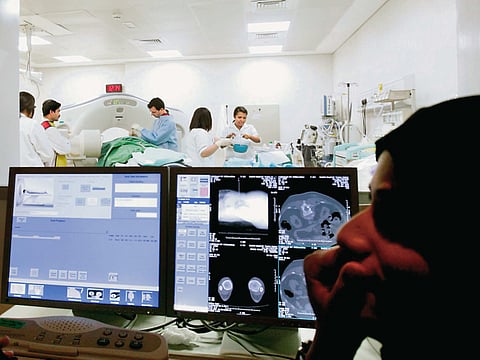Dubai links life-support devices to central database
Hundreds of critical care medical devices in DHA hospitals begin sending patient data to new Salama e-record system

Dubai: Hundreds of life-support devices and critical care equipment such as ventilators, dialysis and anaesthesia machines, cardiac and foetal monitors and incubators in all Dubai government hospitals are being linked to a central database of patients.
By November end, medical records of all patients will be available at the click of a button on the Salama Electronic Medical Records (EMR) system across all Dubai Health Authority hospitals in the emirate, said a top DHA official on Wednesday.
This integrations will ensure that all patient medical records will be unified and be accessible electronically through a unified patient portal eventually making medical records at the DHA a completely paperless project.
The integration is being carried out in phases and the first phase dubbed ‘Wave 1’ was completed in April. Now, ‘Wave 2’ involving linking of 834 devices will be completed by August-end and Wave 3 will be concluded by November-end.
Salama is the name of DHA’s electronic patient medical records project. The DHA-wide project will ensure that electronic patient medical records are available across the DHA health facilities. Additionally, it will help provide patients access to their medical records through a patient portal.
The project will ensure every patient visiting a DHA health hospital has an electronic medical file, which will be accessible across all hospitals and health centres.
The move provides a way to simplify workflow, eliminates human intervention and errors in recording, enhances efficiency and helps doctors with evidence-based decision-making. Additionally, another 400 devices will be integrated along with the Wave 3 roll-out soon, the official added.
Amani Al Jasmi, director of Information Technology at the DHA, elaborated: “All patient’s vital signs are automatically sent from biomedical devices to the DHA’s electronic medical records system (Salama EMR system). This allows the clinician to focus more on direct patient care by quickly validating the vital signs in the system. Elimination of manual entry increases clinical satisfaction and improves patient care and safety.”
The Salama programme’s Wave 2 will go live around mid-August across seven primary health care centres (at Nad Al Sheba, Al Twar, Al Badaa, Al Safa, Al Lusaily, Al Mankhool and Zabeel) and by the end of the month, it will go live across Dubai Hospital, Nad Al Hamar Health Centre, Family Gathering Centre and Dubai Diabetic Centre.
Currently, patients who visit certain DHA health facilities have their medical records available electronically on Salama EMR system, eliminating the need for manual files and ensuring that if they visit multiple DHA health facilities, they will still have only one unified medical record.
The DHA’s IT department has unified about 1.4 million patient records and migrated them to the new Salama system and more than 112 million transactions were migrated before April 2017. Since the initial roll-out in April, approximately, an additional 30 million transactions have been migrated in order to support the Wave 2 roll-out.
The Salama EMR system was integrated with 25 core DHA clinical systems such as dental, lab, radiology etc during its Wave 1 roll-out in April 2017 and was further reintegrated with seven more systems to increase efficiency and data flow. This includes eight government entities.
Box: How the patient benefits
Ease of storage: The result of every test the patient undergoes beginning from a blood glucose or blood pressure score to an echocardiogram is recorded electronically facilitating easy recall.
Eliminates the carrying of bulky files: Patients across all Dubai government hospitals will soon be able to go for medical appointments and just quote their Electronic Medical Record (EMR) number to pull out all records. The system plans to go completely paperless soon.
Facilitate referrals in other hospitals: Patients from Hatta and other regions of the emirate will now be able to get a quick second opinion in bigger government hospitals using quick digital recall of their medical records.
Next stage of integrating records in public and private hospitals: This is on the anvil and will mean a resident will have only one medical file across both public and private health facilities eliminating any duplication of tests and saving money for patients.


